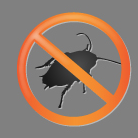Here in the UK there are rats in towns and cities all over the country, from the smallest villages to the largest cities, including Bromley. In larger, heavily populated cities the problem is getting worse. In fact, if we did not see them or hear a story about them from someone at some stage we would think there was something wrong.
The most common rat in the UK and Bromley is the Brown Rat. The brown rat is an opportunistic survivor, foraging for food and harbourage anywhere and everywhere. They tend to live in underground burrows linked by a maze of inter-connecting tunnels, with the entrances near to solid objects and structures. This supplies a safe roof entrance. Once underground they structure a series of layers of tunnels that all interconnect with each other. You will normally find a second entrance hole close to the first. Burrows provide rats with safety and shelter from prey as well as being a storage place for food. As well as entrances near to structures, entrances to burrows can be found in and around overgrowth, at the base of trees and around hedgerows. I once found a large family of rats living in a row of sheds that had been forgotten about. Although the sheds were no longer in use, the previous owners had filled them with all sorts of junk that rats use for nesting including clothes and blankets. It was like an already furnished home for the rats.
Once rats have established themselves a home, providing there is a good food and water supply close by, they will be reluctant to travel to far from the burrow. But rats have been known to travel up to a mile to find food if supplies are sparse. In rural areas it is normally farms that suffer with rats. On farms there is a ready supply of food available to them by way of food for livestock and also the crops. They can do substantial damage to a field of wheat by stripping corns. In towns and cities like Bromley, there is the abundance of available food from restaurants, fast food outlets and coffee shops. There are also the out of date waste foods from shops and stale bakery items. Then there is the household waste. So many of us put our bins out the night before for the bin men to collect, and through no fault of our own we sometimes have to put rubbish out days before it is due to be collected. As rats are mainly a nocturnal scavenger, usually between 1am and 4am, any food waste that is left out is an easy target for the rats to scavenge without too many threats to them.
There are also diseases associated with rats like weils disease, which is spread by infected rats through their urine and excrement. It is extremely rare but if found, can be fatal. If you come in to contact with ant surfaces that a rat has urinated on, that has not been cleaned, there is also sickness and diarrhoea.

